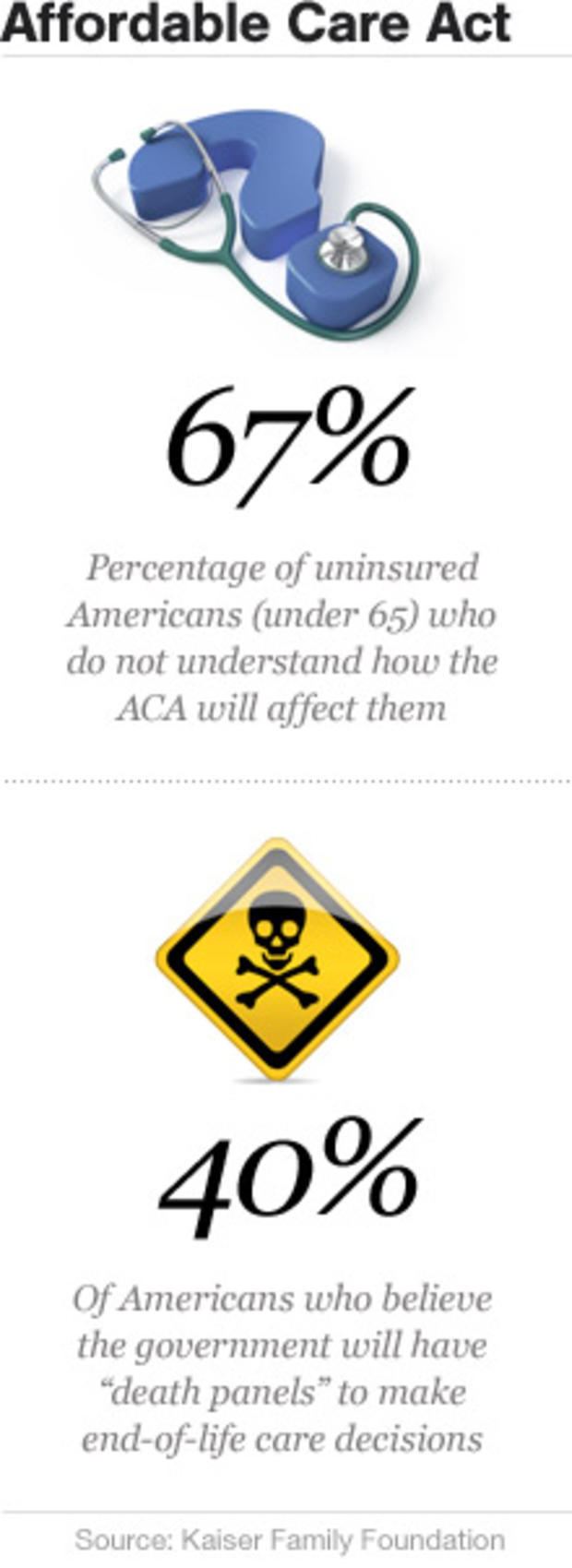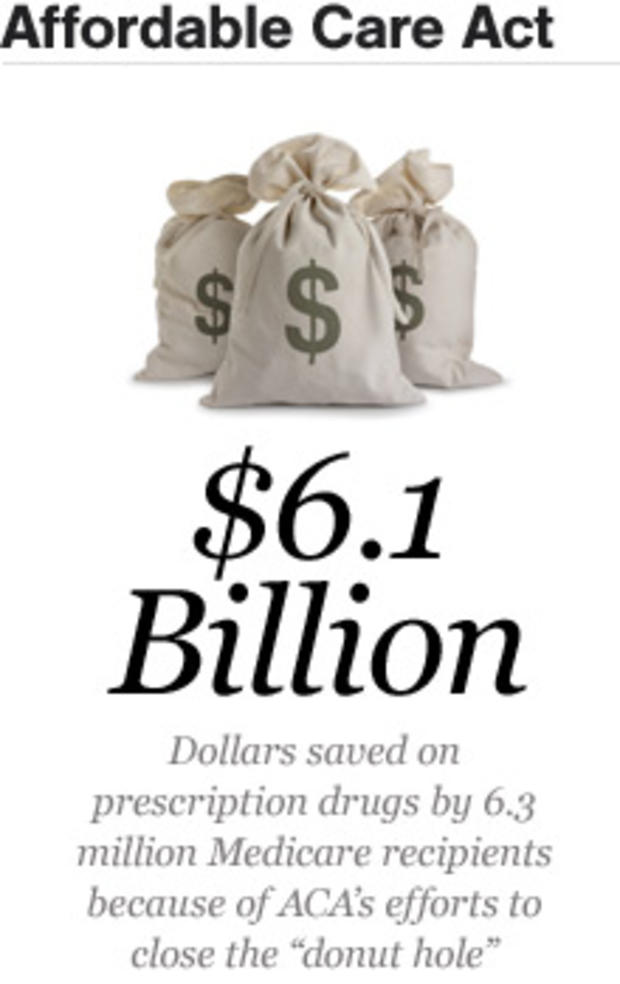Obamacare's 3rd anniversary: By the numbers
The Affordable Care Act has been law of the land for three years now -- President Obama signed the legislation on March 23, 2010 -- but it remains a source of controversy and mystery for many Americans. Meanwhile, some of the most significant parts of the law have yet to take effect.
Three years after the enactment of Obamacare, here's a look at some key figures that shed light on the status of the law's implementation, its impact on the nation and public opinion.
37: Percent of Americans who approve of Obamacare
The Affordable Care Act was divisive from the start. Three years later, not much has changed.
A poll from the nonpartisan, nonprofit Kaiser Family Foundation, conducted March 5-10, found that just 37 percent of Americans have a favorable view of the law while 40 percent have an unfavorable view.
There's a partisan split in opinion, with 68 percent of Republicans saying they view the law unfavorably and 58 percent of Democrats saying they have a positive opinion of the law. Among independents, 31 percent have a favorable view, while 45 percent have an unfavorable view.
Meanwhile, nearly a quarter of Americans -- 23 percent -- declined to offer any opinion on the law. That may not be unreasonable, given that many people don't fully understand the law.
67: Percent of uninsured who still don't know what the law means for them
The Kaiser poll mentioned above found that, three years after it enactment, 67 percent of uninsured Americans under 65 years old (and thus not eligible for Medicare) still don't know how the Affordable Care Act will impact them. Among Americans overall, 57 percent said they didn't understand how they'd be impacted.
The poll also found that Americans still have many misconceptions about the complex, multi-faceted law. For instance, 40 percent of Americans -- including 35 percent of seniors -- still believe that the law created "death panels" to make decisions regarding end-of-life care for Medicare patients.
The idea of "death panels" gained steam as partisans stepped up their extreme rhetoric during the health care debate -- former Gov. Sarah Palin, R-Alaska, was among those using the term, while Sen. Chuck Grassley, R-Iowa, said President Obama wanted to "pull the plug on grandma."
The "death panel" reference referred to a proposal to pay doctors to counsel their Medicare patients about end-of-life issues like living wills and hospice care. After all the controversy, the idea was essentially dropped.
That, however, hasn't kept the law's opponents from using extreme rhetoric. "Let's repeal this failure before it literally kills women, kills children, kills senior citizens," Rep. Michele Bachmann, R-Minn., said of the law on the House floor Thursday. "Let's not do that. Let's love people. Let's care about people. Let's repeal it now while we can."
13: States that say they're not expanding Medicaid
One of the main parts of the health care law that has yet to take effect is the expansion of Medicaid, the joint federal-state program currently open to disabled and certain low-income people. The Affordable Care Act calls for states to open up Medicaid to anyone below 138 percent of the poverty line -- the Supreme Court, however, ruled over the summer that the Medicaid expansion shouldn't be mandatory.
There's no deadline for states to say whether or not they will expand the program, but so far, 13 have said they won't. The Obama administration has argued it expects states to eventually get on board with the idea, once they start seeing the benefits it has in other states. There may be some merit in that idea, as even conservative governors like Gov. Jan Brewer of Arizona have decided to adopt the expansion (even though other conservatives in her state have compared her to Judas for the decision).
Meanwhile, some state lawmakers skeptical of the plan to expand Medicaid are attempting to find a compromise with the federal government. Officials in Arkansas, Ohio, Florida, Louisiana, Pennsylvania and Texas have expressed interest in taking the federal funding available for the expansion and using it to pay for private insurance for low-income people.
Even though the nonpartisan Congressional Budget Office estimated that private insurance plans cost about 50 percen tmore than Medicaid programs, the Health and Human Services Department has given lawmakers in Arkansas "conceptual approval" for the plan, the New York Times reports.
32: Number of states for which the federal government will have to create an exchange, either entirely or partially
In addition to the expansion of Medicaid, next year will also bring the implementation of the health care exchanges -- online marketplaces on which Americans can purchase private insurance. States were given the option of building their own exchange, partnering with the federal government, or letting the federal government build one for them.
The state-based exchanges were intended to give the states more freedom and flexibility to create their own regulations. Many states, however, realized that setting up those rules and infrastructure -- both online and offline -- would take a lot of work. Twenty-six states are leaving it up entirely to the federal government, while six are partnering with the feds. Just 16 states are creating their own, and it's unclear what the two remaining states are doing.
This leaves the federal government with a major task to complete before October 1 -- when enrollment on the exchanges is supposed to open. Consumers should be able to get coverage on the exchanges by 2014. Starting this summer, the government is expected to start serious public outreach programs -- to reach people who could benefit from the exchanges but don't know enough about it (such as the aforementioned 67 percent of uninsured).
21: Number of pages on the application for Obamacare
Figuring out who is eligible for subsidized insurance on the exchanges, or other Obamacare benefits such as the expanded Medicaid coverage, will be complicated -- the current draft application that Americans would have to fill out is 21 pages, the Associated Press first reported. (The Washington Post has the application here.)
The document asks for information on everything from income to whether any family members are Alaska Natives, and at least three federal agencies -- including the IRS -- would have to review the application, according to the AP.
$6.1 Billion: Savings to seniors from fixing the Medicare "donut hole"
While significant portions of the law have yet to take effect, other parts are already having a significant, positive impact. For instance, the law has started closing the Medicare "donut hole" -- the gap in prescription drug coverage under Medicare Part D.
The Affordable Care Act started closing the gap in 2010 by giving $250 checks to seniors who fell in the coverage gap, and by providing additional coverage gradually, the law should close the gap by 2020. This year, the health care law provides discounts and savings for 52.5 percent of the cost of most brand name drugs and 21 percent of the cost of covered generic drugs.
The Health and Human Services Department announced this week that more than 6.3 million people with Medicare have saved over $6.1 billion on prescription drugs because of the law.

